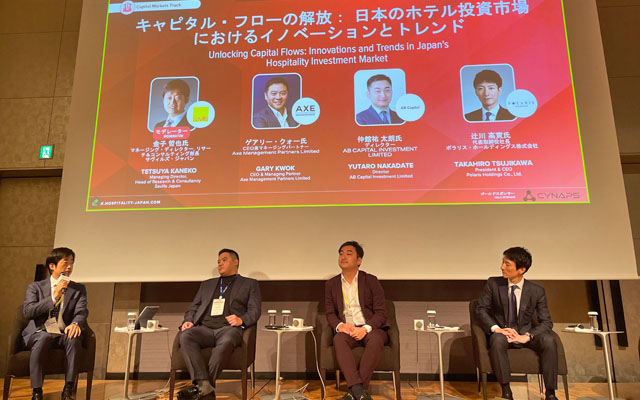Japan’s hotel investment outlook looks promising, with growing demand and improving supply, including refurbished properties and new luxury hotels, according to experts at the Hospitality Japan Conference.
Speaking at the event in October, Caspar Pingel Schmidt, managing director of QCC Collection Group, said international hotels have high potential to grow in Japan, where only seven per cent of hotels are foreign-branded.

“The demand for hospitality in Japan is very strong”, due to the attractive prices and high-quality, said Gary Kwok, CEO and managing partner at Axe Management Partners.
Rising construction costs and a shortage of labour, however, are constraining supply of new properties, leading to more renovation and rebranding of existing properties.
It is a popular strategy for investors from an ESG perspective and on practical terms, agreed the speakers, as apartment-type hotels can be run by fewer staff, helping future-proof the properties amid Japan’s population decline.
Still, more supply, particularly in rural areas, is needed for the Japanese government to achieve its goal of welcoming 60 million tourists annually by 2030. The target is for each visitor to spend at least two nights in regional areas.
“Investors had been piling into Japan (pre-Covid), creating over supply – but some hotels were converted into other uses during the pandemic. Now, there is a lot of supply but it is not going to meet the growing demand,” said Kwok. “Investors should work with local governments to promote second- and third-tier cities, because they are important for the long-term sustainable growth of tourism.”
Cooperation is key, added Midori Kataoka, regional director at Preferred Hotels & Resorts, noting that luxury destinations can be created outside the “golden route” only with “meticulous planning with national and regional governments”.
Nico Black, general manager at Six Senses Kyoto, said luxury hotels can “revive small towns” through job creation and community engagement.
Challenges remain though, according to Takahiro Tsujikawa, president and CEO at Polaris Holdings Co., adding that “investors remain very cautious about investing in non-major cities, resulting in less supply coming into rural areas” while Kyoto and Okinawa have many luxury hotels but a shortage of two- and three-star hotels.


















